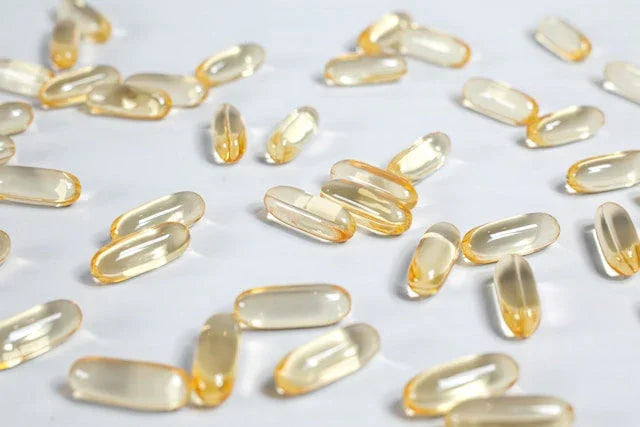
All about vitamins and minerals: “The top 10 vitamins and minerals your body needs”
Vitamins and Minerals: What You Should Know
You’ve probably often heard about the importance of vitamins and minerals. But which vitamins and minerals really matter to help you feel better, fitter, or healthier? In this blog, we’ll dive into these questions and explain everything you need to know about vitamins and minerals.
Let’s start at the beginning. There is a clear difference between vitamins and minerals. Vitamins are organic, meaning they come from living organisms and are produced by certain animals or plants. Minerals, on the other hand, are inorganic, meaning they come from non-living sources and are absorbed by animals or plants from soil, food, or water.
Contents
- The importance of vitamins
- Types of vitamins
- Top 5 vitamins
- The importance of minerals
- Types of minerals
- Top 5 minerals
- Deficiency & maximum intake
The Importance of Vitamins
Your body requires vitamins daily to function. Vitamins assist in hormone and enzyme production and with maintaining energy, immunity, and metabolism. They are also vital for proper muscle function. Some vitamins cannot be produced by the body itself, which is why a healthy diet with sufficient fruits and vegetables is so important.
Vitamins are not used as an energy source, but as essential compounds needed for various processes throughout the body. A deficiency can cause symptoms such as fatigue or lowered immunity. Vitamins influence the immune system and are essential for building cells, blood, bones, and teeth.
Types of Vitamins
There are 13 different types of vitamins: four fat-soluble and nine water-soluble. The fat-soluble vitamins are A, D, E, and K, found in fats of foods and stored in body tissue.
The water-soluble vitamins are: B1, B2, B3, B5, B6, B8, B11, B12, and C. These are found in the fluid of foods. With the exception of B12, the body cannot store them well, and excess is excreted in urine. This is why most vitamins must be regularly obtained from food. The body produces two vitamins itself: vitamin D (through sunlight) and vitamin K (through gut bacteria).
Top 5 Vitamins
- Vitamin C
- Vitamin D
- Vitamin A
- Vitamin B6
- Vitamin B12
The Top 5 Vitamins According to Ergomax:
Vitamin C: Acts as an antioxidant, helps form connective tissue, supports iron absorption, and boosts immunity. Found in fruits, vegetables, and potatoes, especially cabbage, citrus, kiwis, berries, and strawberries.
Vitamin D: Important for calcium absorption for strong bones and teeth, as well as immune function. Sunlight is the main source.
Vitamin A: Supports growth, healthy skin, hair, nails, and vision. Too much vitamin A can be harmful, especially for children and pregnant women.
Vitamin B6: Plays a role in metabolism, the breakdown and synthesis of amino acids, and supports hormones, growth, and the immune system.
Vitamin B12: Needed for blood and nerves. A deficiency can cause anemia and nerve damage.
The Importance of Minerals
Minerals, like vitamins, are nutrients found in small amounts in food and drinks. They are inorganic and play a role in muscle and nerve function as well as health, growth, and development.
They are essential as building blocks for bones and tissues. The best-known minerals in our diet are calcium, sodium, magnesium, potassium, and phosphorus. They provide no energy, and too much of certain minerals can be harmful.
Types of Minerals
A distinction is made between minerals and trace elements. Minerals are needed in larger amounts: calcium, magnesium, sodium, potassium, chloride, and phosphorus. Essential trace elements include iron, iodine, chromium, zinc, copper, selenium, manganese, and molybdenum.
Top 5 Minerals
- Magnesium
- Calcium
- Phosphorus
- Potassium
- Sodium
The Top 5 Minerals According to Ergomax:
Magnesium: Found in grains, vegetables, nuts, and dairy products. Important for bones, muscles, nerve function, and heart health.
Calcium: Found in milk, dairy, cheese, certain vegetables, and grains. Essential for bones, teeth, and blood clotting.
Phosphorus: Found in dairy, meat, legumes, and whole grains. Provides strength to bones and teeth and plays a role in energy metabolism.
Potassium: Involved in fluid balance, blood pressure regulation, nerve transmission, and muscle function. Found in vegetables, fruits, potatoes, meat, fish, and nuts.
Sodium: Essential for fluid balance and blood pressure. Main source is table salt.
Deficiency & Maximum Intake
Vitamin or mineral deficiencies can negatively affect health. Common complaints include fatigue, concentration problems, insomnia, lack of energy, and muscle cramps. A calcium deficiency can lead to osteoporosis or fractures. A vitamin B12 deficiency can cause anemia. Iron deficiency causes fatigue and weakens the immune system.

